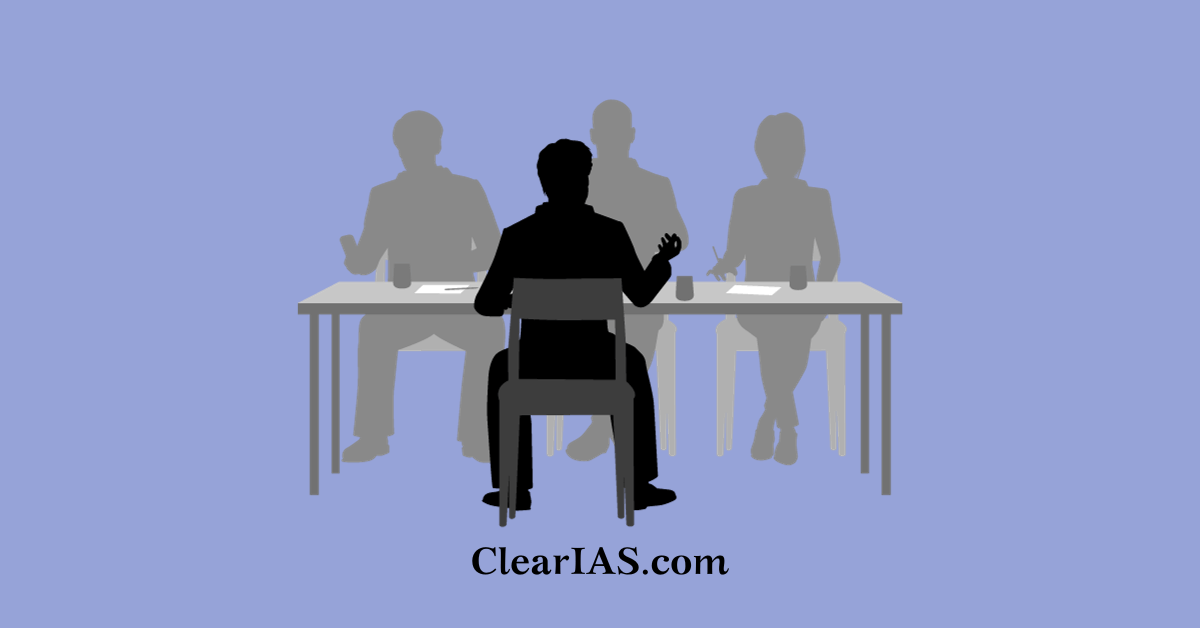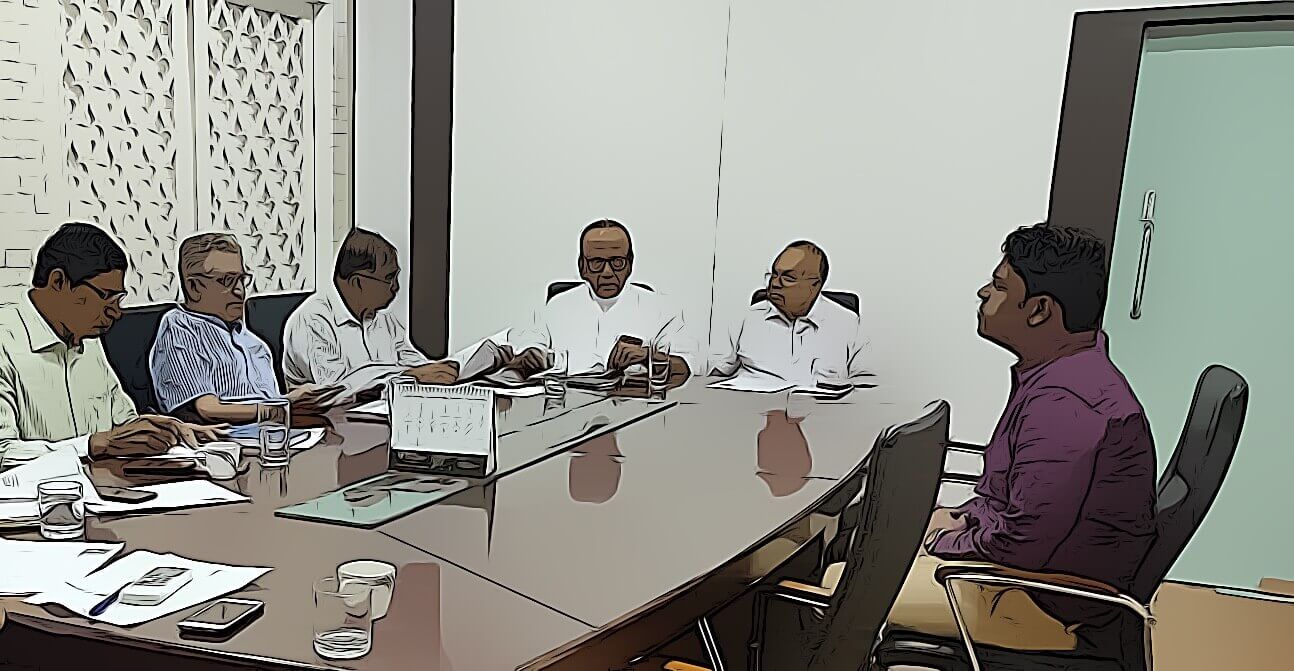
How should you answer questions outside of your bio-data (Detailed Application Form) in the UPSC interview?
This article focuses on selected sample topics outside of the Detailed Application Form (DAF) that could be discussed as part of the personality test by UPSC.
What is being tested in the UPSC Personality Test?
The following are some excerpts from the UPSC Civil Services Exam (CSE) notification:
“The object of the interview is to assess the personal suitability of the candidate for a career in public service. This is really an assessment of not only his intellectual qualities but also social traits and his interest in current affairs. Some of the qualities to be judged are
- Mental alertness
- Critical powers of assimilation
- Clear and logical exposition
- Balance of judgement
- Variety and depth of interest
- The ability for social cohesion and leadership
- Intellectual and moral integrity”
How will you be tested in the UPSC Personality Test?

“The technique of the interview is a natural, though directed and purposive conversation.”
In summary, there will be a conversation between the members of the board and the candidate during which the qualities mentioned above will be tested.
The topic of the conversation could be from the DAF which forms the core of the test and must be prepared for exhaustively, and/or certain other aspects like current affairs, subjective questions and general queries which contribute substantially towards the assessment of the candidate by the board.
UPSC Personality Test: Sample Questions Outside Your DAF (Bio-data)
While there are many types of questions in UPSC Civil Services Interview like puzzles, role-plays, or situational analysis, the predominant question-type is to seek candidates opinion on current affairs.
Let us see some questions outside of DAF connected with the current issues.
Topic: Reservation
Question: What are your views on the reservation?
Follow up questions:
- Should it still continue after spending so much of education?
- Should the reservation be made time-bound?
- Are reservations against the concept of equality?
- Should poverty be one of the criteria for providing reservation?
- A related question might be asked by another board member/ at a later stage, like do you think its time we move towards meritocracy in administration?
A candidate who is pro-reservation shouldn’t contradict himself with the meritocracy question.
Topic: Social Problems in India
Question: The social problems that are currently faced by our country are the same things that we encountered at the time of Independence. Does that mean India has failed as a State?
- This question presumes that we are facing the same issues then and now.
- If a candidate questions the presumption, then follow up questions could include:
We were facing poverty and illiteracy at the time of independence and the same continues even now, don’t you think?
- If the presumption is accepted then the candidate has to justify why India shouldn’t be seen as a failed State despite not being able to solve the social issues since independence.
Topic: Status of women
Question: What are the reasons for the deterioration in the status of women in our society from ancient to modern times?
This is another presumptive question that assumes that the status of women has deteriorated in our society over the years.
If the presumption is countered, follow up questions may include:
- If the status of women has improved, then why haven’t women representation in the labour force and in Parliament/assemblies increased?
- Why India is having poor Gender Inequality Index?
- Why we are witnessing increasing crimes against women?
If the presumption is accepted, then the candidate is agreeing that the status of women in ancient times was better than it is today which is a position hard to justify.
Topic: Population control
Question: How to control the growth of population in India? Should we follow one child per family policy like China?
If the candidate answers that we shouldn’t follow the Chinese model but focus on women education, raising the status of women, late marriage etc.; follow up questions may include:
- Most of these measures were attempted from as early as 1951-52 onwards via different committees and Five-Year Plans. Despite these, the population of India grew at a faster pace and is still growing. So, don’t you think that coercive measures are necessary?
- Do you think families in rural India will accept delayed marriage of their daughters?
- Many educated girls are getting married early. So, is there a correlation between female literacy and birth control?
If the candidate is agreeing that we should follow the Chinese example, then questions like:
- How will a democratic country like India enforce such a draconian measure?
- China abolished its one child per family policy in 2016 when it led to an ageing society. So, don’t you think that the same situation could happen in India?
Topic: Need for Rajya Sabha
Question: What is the need for Rajya Sabha? After all, it doesn’t have any real powers.
Follow up questions based for both proponents and opponents include:
- Do you approve of a system where an indirectly elected House like Rajya Sabha can hold up proposals approved by the directly elected Lok Sabha which represents the will of the people?
- Eventually, the ruling party will be able to form a majority in Rajya Sabha as well. So how will the system of checks and balances of a bi-cameral Parliament be available then?
- Should we continue nomination of members to Rajya Sabha?
- What are the steps to be taken to increase the relevance of Rajya Sabha?
Topic: Elections
Question: Do you think we should move from FPTP to Proportional Representation system?
Follow up questions if the answer is pro FPTP:
- Doesn’t it create an anomaly when it leads to a situation where the majority of the electorate do not find representation in an elected body?
- With FPTP, the MLA or MP tend to focus more on people who voted for him/her. Doesn’t it lead to vote-bank politics?
- The FPTP system can lead to majoritarianism. For example, the recent elections have resulted in one of the lowest Muslim representation in the Lok Sabha. Don’t you think that this should change?
- If the candidate answers that the PR system is good but too complicated for illiterate people to understand; then follow up question may be like why do you assume that the Indian people won’t be able to understand PR system?
Follow up question for pro PR system:
- Isn’t the PR system too complex for a layman to understand?
- Because of the representation of multiple parties in a PR system, doesn’t it slow down decision making?
- Isn’t it possible that in a PR system, smaller regional parties will hold national parties to ransom in coalition negotiations?
Topic: Form of government
Question: Should we move towards the Presidential form of government because, in reality, that’s what we are witnessing in our country?
Follow up questions for pro-Parliamentary government:
- Didn’t the Union Constitution Committee choose parliamentary system only because its members were more familiar with it more than anything else?
- Isn’t the Presidential form of government more stable and accountable?
- A President fully in control of the executive will be able to attract the best people and will be more performance-oriented. Isn’t that a system which India sorely needs?
Follow up questions for pro-Presidential government:
- We have seen even Prime ministers acting autocratically. Can a directly elected President assume dictatorial powers in the Indian context?
- Doesn’t it lead to a situation where the executive is not responsible for the directly elected legislature?
- What if the president belongs to one party and the legislature is controlled by another party? Won’t it lead to conflict?
Topic: Capital Punishment
Question: What are your views on capital punishment?
Follow up questions:
- Don’t you think that everyone has an inalienable human right to life?
- Isn’t there a chance that an innocent might get killed?
- Isn’t retribution a wrong tendency to have in the land of Gandhi?
- Do you support capital punishment for crimes like rape?
- Won’t fear of death act as a deterrent against crimes?
Topic: Uniform Civil Code (UCC)
Question: What are your views on Uniform Civil Code?
Follow up questions for anti-UCC:
- Doesn’t the personal law system violate the principle of equality?
- Aren’t laws like special marriage act sufficient to cover people of all faith in India?
- Don’t you think that the introduction of UCC will lead to the betterment of the position of women in India?
Follow up questions for pro-UCC:
- Is it desirable for a diverse country like ours?
- People are used to the present system of personal laws. Why create a separate code when the present system can be harmonized with existing laws?
- Won’t the minority communities feel threatened with the implementation of UCC?
Topic: Freedom of Speech and Expression
Question: Do you think that India lacks the space for freedom of speech and expression these days?
Follow up questions:
- How will you reconcile Freedom of Speech with Civil Service Conduct rules?
- Don’t you think sedition charges are used unreasonably with the sole intention of curbing free speech?
- Isn’t it time to reconsider portions of Penal Code that criminalizes defamation?
- What do you think about the freedom of the press in India?
Tips to handle questions outside the DAF in the UPSC Personality Test
Candidates must keep in mind that the personality test is not intended to be a test either of the specialized or general knowledge but an assessment of intellectual qualities and social traits.
There is no ideal answer.
Lack of knowledge will not be penalized at this stage (unless it is about something fundamental which any educated person is bound to know).
Arrive at your answers/form your opinion based on facts known to you and be ready for cross-questions and follow up questions.
Maintain absolute honesty and integrity. Never contradict yourself. Follow up questions are largely based on the answers given by the candidate. However, it doesn’t mean that follow up questions will be sequential. A random question at the finishing stage of the interview could be following up from something the candidate has said at the beginning of the interview.
Don’t expect the questions to be rational. Sometimes presumptive questions can be asked to judge whether the candidate is having an independent opinion.
While answering be humble, be positive and think of the larger picture.
To quote Pandit Nehru,
“Administration is meant to achieve something and not to exist in some kind of an ivory tower following certain rules of procedure and Narcissus-like looking on itself with complete satisfaction. The test, after all, is the human being and their welfare.”
Article Contributed by Ganesh Kumar V B. The author is an Indian Postal Service officer currently working at Madurai. In his free time, Ganesh volunteers to mentor Civil Service aspirants.






Leave a Reply